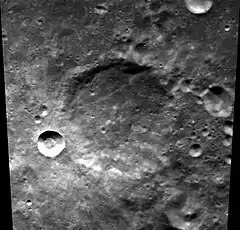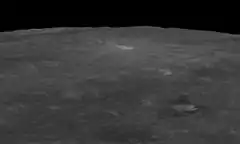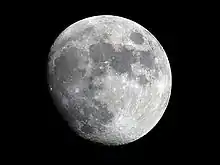Fechner (crater)
Fechner is a lunar impact crater that lies on the far side of the Moon's southern hemisphere, attached to the western rim of the large walled plain Planck. The eastern rim of Fechner intersects the Vallis Planck, a long, wide cleft in the surface that follows a course to the north-northwest. This valley intrudes into the southeastern rim of the crater, then continues northwards from the periphery of the northeast rim.
 Clementine mosaic with Fechner at center. Fechner T is the small bright crater at left. | |
| Coordinates | 59.0°S 124.9°E |
|---|---|
| Diameter | 63 km |
| Depth | Unknown |
| Colongitude | 237° at sunrise |
| Eponym | Gustav T. Fechner |

Attached to the western rim of Fechner is Fechner T, a small, bowl-shaped crater with a relatively high albedo ray system. This satellite crater is surrounded by a blanket of light-hued ejecta that spills across the southwestern half of Fechner's interior floor. The crater rim of Fechner is relatively worn and eroded, with the eastern half of the rim reshaped due to the valley and proximity to Planck. The interior floor is marked by several small craters.
The crater is named after Gustav Theodor Fechner, a German physicist, psychologist, and philosopher (1801-1887). The name was approved by the IAU in 1970.[1]
Satellite craters
By convention these features are identified on lunar maps by placing the letter on the side of the crater midpoint that is closest to Fechner.
| Fechner | Latitude | Longitude | Diameter |
|---|---|---|---|
| T | 59.1° S | 122.9° E | 14 km |
References
- Fechner, Gazetteer of Planetary Nomenclature, International Astronomical Union (IAU) Working Group for Planetary System Nomenclature (WGPSN)
Bibliography
- Andersson, L. E.; Whitaker, E. A. (1982). NASA Catalogue of Lunar Nomenclature. NASA RP-1097.CS1 maint: ref=harv (link)
- Blue, Jennifer (July 25, 2007). "Gazetteer of Planetary Nomenclature". USGS. Retrieved 2007-08-05.CS1 maint: ref=harv (link)
- Bussey, B.; Spudis, P. (2004). The Clementine Atlas of the Moon. New York: Cambridge University Press. ISBN 978-0-521-81528-4.CS1 maint: ref=harv (link)
- Cocks, Elijah E.; Cocks, Josiah C. (1995). Who's Who on the Moon: A Biographical Dictionary of Lunar Nomenclature. Tudor Publishers. ISBN 978-0-936389-27-1.CS1 maint: ref=harv (link)
- McDowell, Jonathan (July 15, 2007). "Lunar Nomenclature". Jonathan's Space Report. Retrieved 2007-10-24.CS1 maint: ref=harv (link)
- Menzel, D. H.; Minnaert, M.; Levin, B.; Dollfus, A.; Bell, B. (1971). "Report on Lunar Nomenclature by the Working Group of Commission 17 of the IAU". Space Science Reviews. 12 (2): 136–186. Bibcode:1971SSRv...12..136M. doi:10.1007/BF00171763.
- Moore, Patrick (2001). On the Moon. Sterling Publishing Co. ISBN 978-0-304-35469-6.CS1 maint: ref=harv (link)
- Price, Fred W. (1988). The Moon Observer's Handbook. Cambridge University Press. ISBN 978-0-521-33500-3.CS1 maint: ref=harv (link)
- Rükl, Antonín (1990). Atlas of the Moon. Kalmbach Books. ISBN 978-0-913135-17-4.CS1 maint: ref=harv (link)
- Webb, Rev. T. W. (1962). Celestial Objects for Common Telescopes (6th revised ed.). Dover. ISBN 978-0-486-20917-3.CS1 maint: ref=harv (link)
- Whitaker, Ewen A. (1999). Mapping and Naming the Moon. Cambridge University Press. ISBN 978-0-521-62248-6.CS1 maint: ref=harv (link)
- Wlasuk, Peter T. (2000). Observing the Moon. Springer. ISBN 978-1-85233-193-1.CS1 maint: ref=harv (link)
